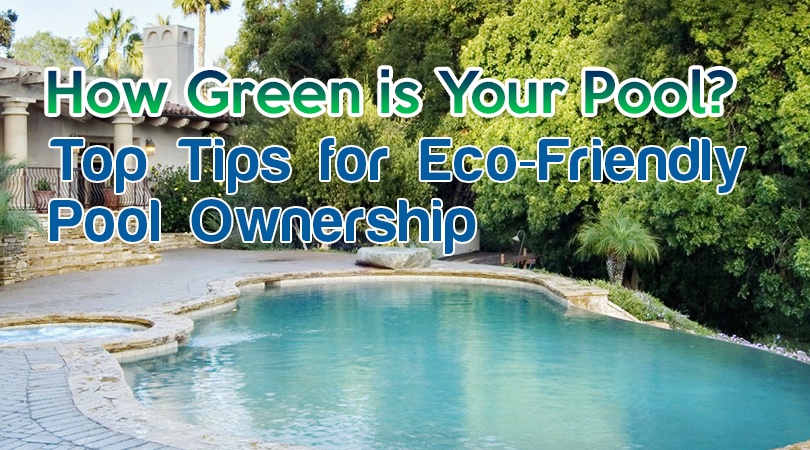
A pool cover is the first way to keep your pool clean, limit evaporation and save energy. The cover keeps out dirt and debris including twigs, leaves and flower petals. This limits the amount of time you have to spend cleaning the pool yourself. It helps the skimmer basket assembly that collects the debris from having to work all the time.
Your pool should be covered when it is not in use. Many covers are easily rolled over the pool in late afternoon and evening. This limits evaporation. Water evaporates at night even without the sun. Less evaporation conserves water and saves money.
Sunlight warms the water, but a pool cover also holds in heat. This is called passive solar heating, and is one way to heat a pool the “green way.” There are solar covers that can also be used to absorb sunlight during the day. The warmth will remain in the covered pool or spa tub during the cooler evening hours.
Solar heating systems are available that use less energy than a regular heater. The water is warmed by the system after it passes through the filter. Solar energy powers the motor. A complete solar power assembly can be used to work the entire pump system.
Backwashing the filter once a month also helps to save energy since the pump does not have to work as hard. Keep an eye on the skimmer basket and keep it clean, as well.
Check out pool pump systems that are Energy Star approved for maximum energy efficiency. Use robotic cleaners to keep the bottom and sides of the pool clean. Your pool pump system should be on a timer and turned off when the pool is not being used to save energy.
Your eco-friendly pool should use less chlorine. This major sanitizer evaporates in sunlight and stabilizers are often needed to control chlorine loss. Newer chemicals that are not as harsh will keep your pool clean and clear. This includes PHMB, poly hexamethylene biguanide, which is not as harsh as chlorine. You do not get the odor associated with chlorine that is actually the result of dead bacteria in the water.
Saltwater pools are now popular. Less chlorine is necessary when the salt cylinders are used to keep the water clean. Pool water is more buoyant with salt added although it is not the same as seawater.
A natural, eco-friendly pool uses plants to purify the water. Moss and reeds turn the pool into a "cement pond." This takes an adjustment if you are used to swimming in a clear blue pool. Certain types of moss destroy algae and eat harmful bacteria. Muriatic acid, chlorine, and other chemicals are not required.
A filter system, similar to the type found in a fish tank, is used to filter and circulate the water. Some of the aquatic plants found in tropical freshwater fish tanks are used in natural pools. The water remains clear.
Even an eco-friendly pool can begin to leak. If you notice the water level has dropped it’s time to check for a leak. The sooner it is found and repaired the less likely the leak will upset the chemical balance and filter system in a pool or spa tub. Aquaman Leak Detection will find and repair leaks immediately in Brevard County or throughout Florida.

With over 20 years of reputable experience finding leaks, owner Lowell Ball created a unique and patented leak detection system that accurately finds leaks without damaging property. We are so confident in our system and our workmanship, we offer the strongest warranty in the industry.
Aquaman Leak Detection Corporate
1275 South Patrick Dr, Suite A6
Satellite Beach, FL 32937
Owner Direct: 321.431.4784
844.766.5532 (844 POOL LEAK)
info@aquamanleakdetection.com
Office Hours:
9AM-6PM Mon-Fri
Emergency Service Available 24/7
Blog Comments